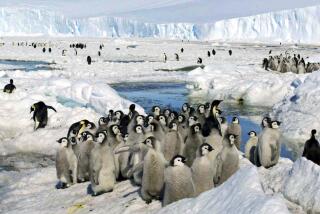Huskies Soon to Be Out of Antarctic Cold
- Share via
SYDNEY, Australia — Each bitterly cold winter morning, workers at Mawson station in Antarctica trudge outside to dig their sled dogs out of the overnight snow and feed them.
It is a chore the Australians won’t have much longer, but they are not giving it up willingly.
The hard-working huskies, a staple of expeditions since polar exploration began, are being phased out because of environmental concerns and advances in technology.
“It’s a sad thing that they’re going,” Al Rooke, communications officer and a dog handler in his spare time, said by telephone from Mawson. “It’s the end of a long era and tradition. Most of us have become quite attached to the critters.”
Only Australia, Britain and Argentina still keep dogs at their Antarctic bases. All agreed last year to end the canine presence by April 1, 1994.
Other countries with claims on sections of Antarctica expressed worry about the possible introduction of disease by the dogs and what might happen if some escaped and attacked penguin colonies.
Britain has decided to let its 19 huskies live out their lives at Rothera, one of its five Antarctic bases, even if that violates the deadline, said Bernard Moran, spokesman for the British Antarctic Survey.
Argentina’s Defense Department plans to transfer its dogs, about 14, to border police in the Andes.
Australia will send the youngest 19 dogs to the Outward Bound school and Wintergreen winter lodge at Ely, Minn., and probably will let the older seven live out their lives at Mawson.
Affection for the huskies runs deep among the polar crews, particularly in the long winters.
Base personnel “get a great deal of comfort from having the dogs around,” Moran said. “They feed them, play with them, take care of them. It’s like having children around.”
Dog photographs and blood-line charts hold places of honor in the Mawson bar. Some men spend their spare time working on new harnesses or handling other maintenance work for the dogs.
“A lot of guys will just hitch up a team and go for a run,” said Rooke, 40, the Mawson communications officer. “The dogs love it. As soon as they see the harness come out of the shed, the noise is awful.”
Huskies, which trace their roots to Greenland, have been at Mawson since the base was established in 1954. The barrel-chested dogs weigh about 90 pounds each and a team of nine can pull half a ton of cargo.
The introduction of motorized sleds, trucks with tank-like treads and other all-terrain vehicles has led to a feeling in some quarters that dogs are outdated, but many polar hands disagree.
“It’s generally accepted that dogs have a sense about the danger of thin ice; they can hear it cracking,” Rooke said. “With the noise of a vehicle, sometimes the first you know about water is when you’re in it.”
Rod Ledingham, who drove dogs for a British expedition in the 1960s and was on the Australian government committee on what to do with the Mawson huskies, believes the dogs should stay.
“Everybody knows this is not an environmentally sound decision,” he said. “There will be more pollution from diesel fumes, more noise.”
After Australia announced last year that its dogs would be removed, the government received dozens of letters from kennels and individuals interested in taking them. But even the dogs’ greatest champions warned against that.
“These dogs aren’t the sort of animals anyone would want to keep as pets,” Rooke said. “Although they’re very affectionate toward humans, they love to scrap with each other. They’re very wild and they do hold grudges. I’d hate to see one get loose in a Sydney pet shop.”
Rooke and fellow handler David Pottage will spend the first winter in Minnesota with the dogs to get them adjusted.
“I feel rather privileged,” Rooke said. “Other men here are looking forward to going over and sledding with them. I’d like to schedule my annual vacation there.”
More to Read
Sign up for Essential California
The most important California stories and recommendations in your inbox every morning.
You may occasionally receive promotional content from the Los Angeles Times.












